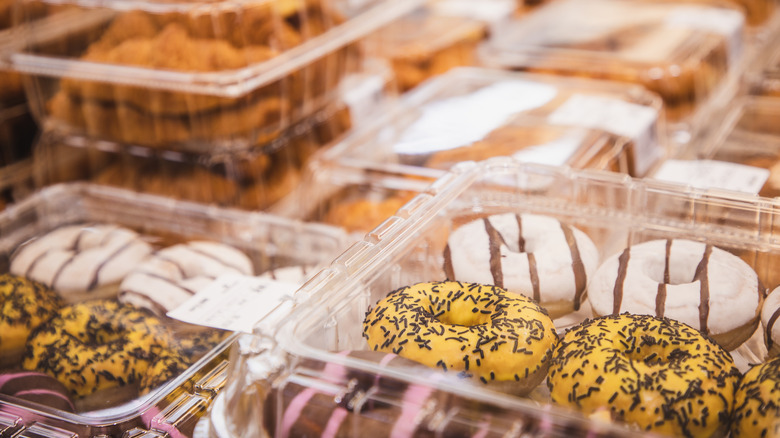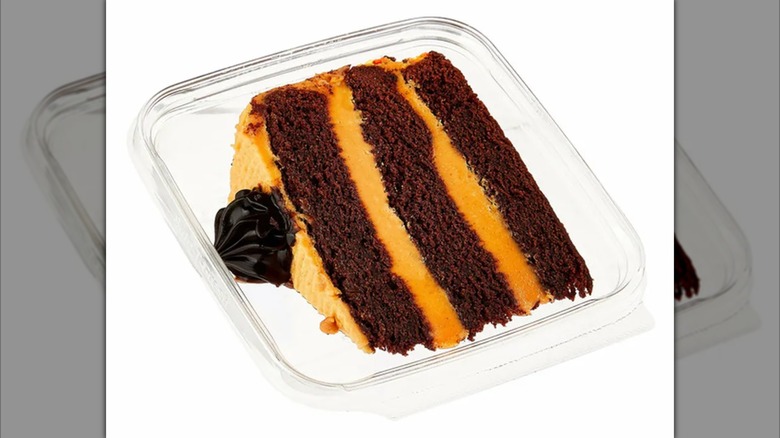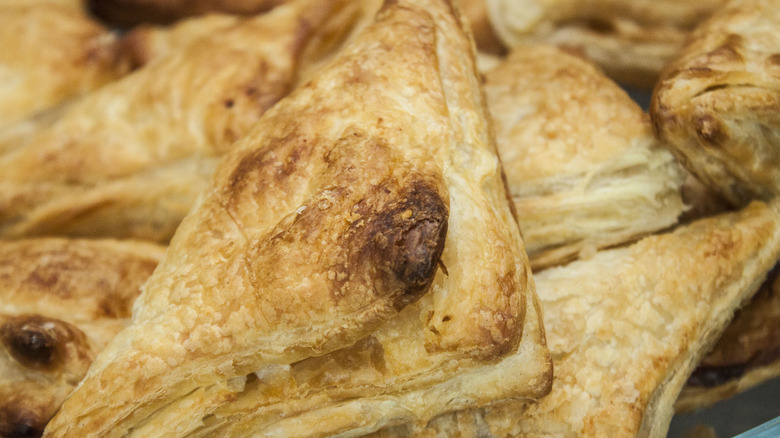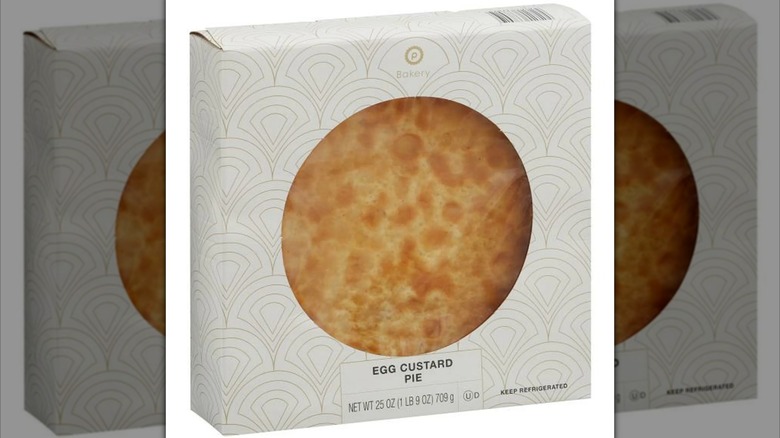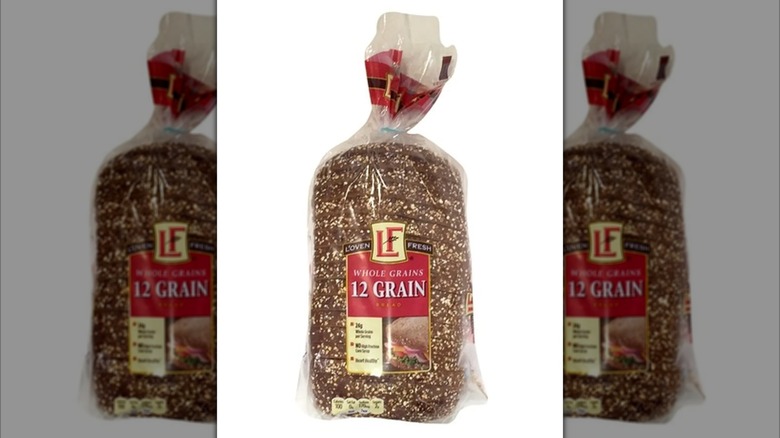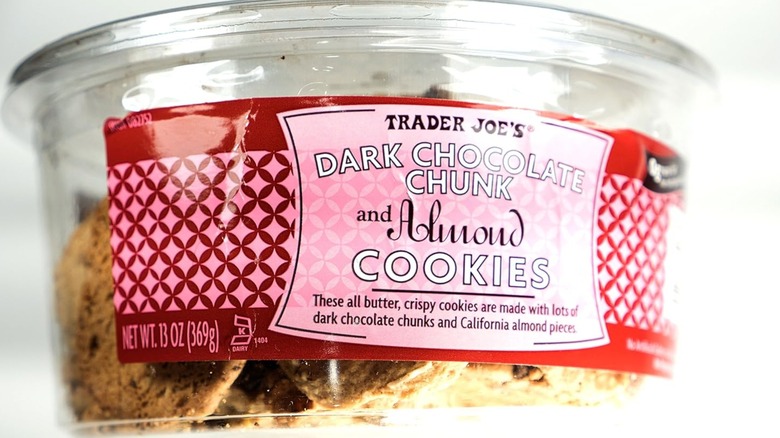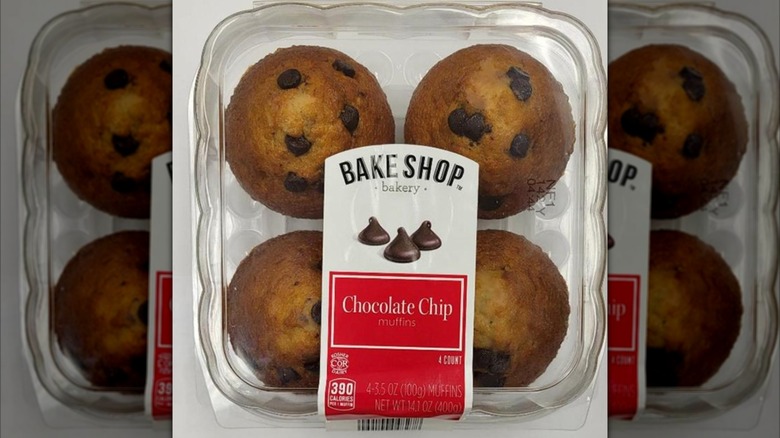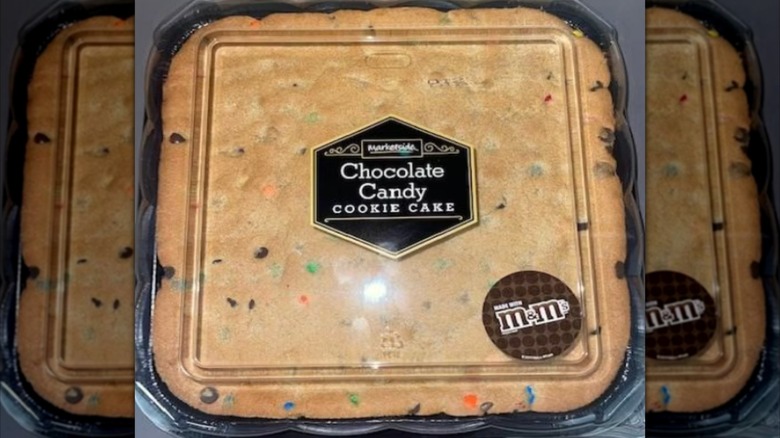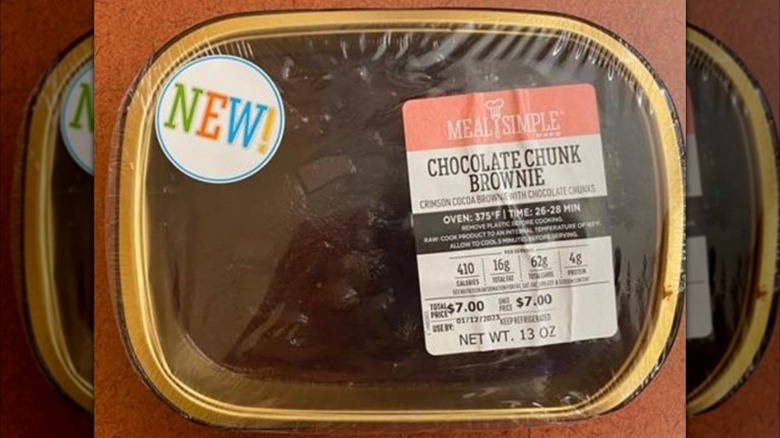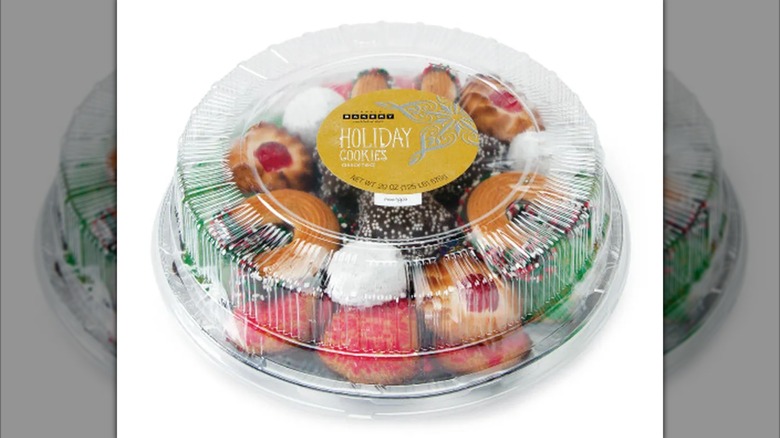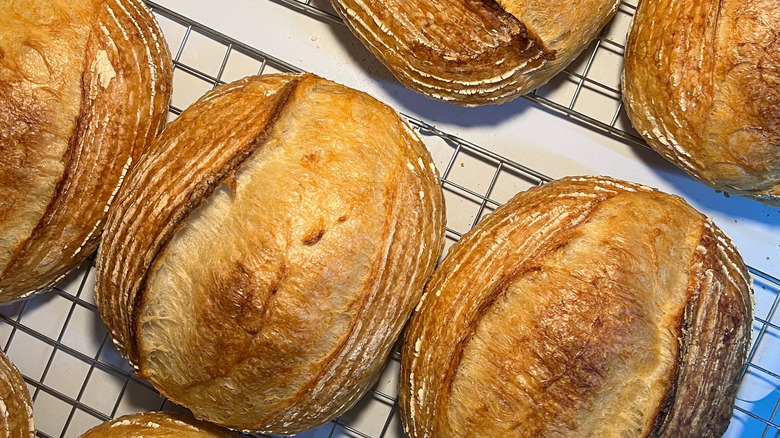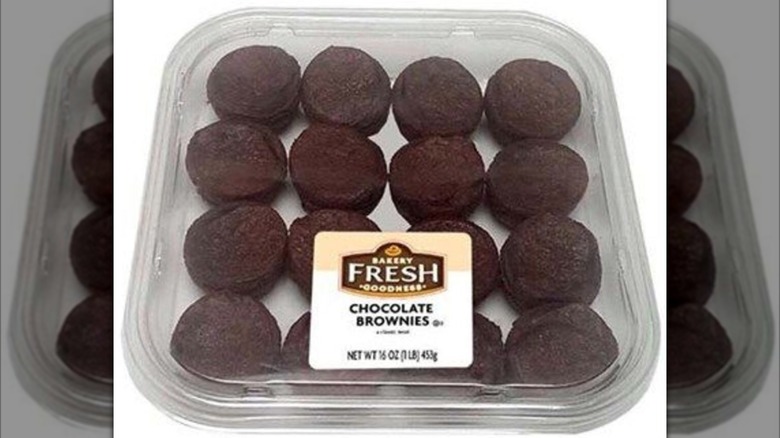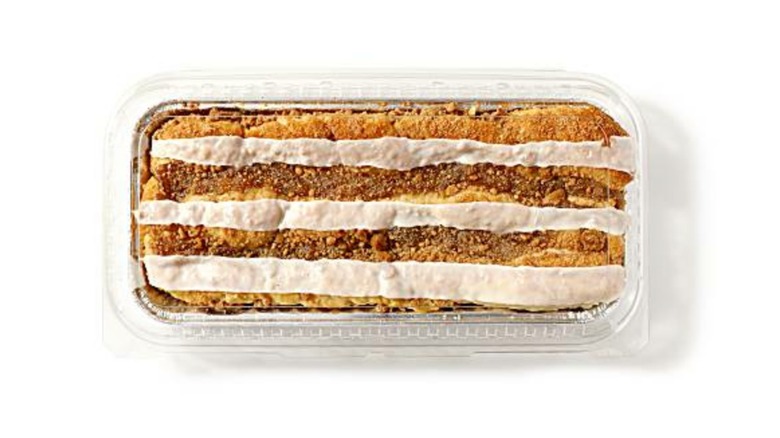12 Grocery Store Bakery Recalls We Wish We Could Forget
We may receive a commission on purchases made from links.
The grocery store bakery section should be a place of joy, right? Cookies. Cakes. Brownies. It's the place we drift to when we're in need of a pick-me-up — and it's the last place we want to have issues with our food. Unfortunately, though, grocery store bakery sections can be much riskier than you might think, and a surprisingly high number of items stocking these shelves over the years have had to be recalled by the very people who made them. What should be delightfully delicious food items have instead been found time and time again to be substandard, contaminated, or even harmful.
By their very nature, baked goods are processed items, and that processing leaves them highly susceptible to being contaminated. Bakery items may contain spoiled ingredients or be vehicles for foodborne illnesses from Salmonella, Listeria, or Bacillus cereus bacteria. The processing they undergo also means that they're composed of ingredients coming from many different sources, which heightens the risk of contamination from foreign material or inadvertent allergens making it into the food itself. As baked goods are often made with or alongside foods that have nuts, they can present an even bigger allergen risk than other parts of the grocery store. Once you take a look at these grocery store bakery recalls, you'll be thinking twice about grabbing those sugary treats.
1. Walmart had to recall its peanut butter chocolate cake after peanuts weren't listed as an allergen
When it comes to some recalls, certain ingredients can be hiding in plain sight — but one 2023 recall from Walmart really took the cake, if you'll excuse the pun. The retailer was forced to recall almost 1,000 units of its cake products, after finding out that some of its Marketside Ultimate Peanut Butter Chocolate Cake had been mislabeled as its Marketside Chocolate Chip Explosion Cake. Because of this, one of its key ingredients and allergens, peanuts, was not listed anywhere on the ingredients list or its allergen information.
Naturally, this presented a massive problem for Walmart, given how dangerous peanut allergies can be. The retailer scrambled to track down all of the units of this cake product, which was made by producer David's Cookies. While folks may have been able to smell the peanuts in the peanut butter cake (which contrary to popular belief does not cause an allergic reaction, according to UNC Health Talk), which could have prevented those with allergies from taking a big bite, it's clear that Walmart couldn't justify not chasing down this faulty product. The good news for the supermarket company was that at the time of recall, nobody had reported becoming sick from ingestion.
2. A large amount of Kroger baked goods were recalled due to metal contamination
Kroger's Country Oven brand is usually pretty reliable, and customers have come to expect a wide variety of products under its name. However, the size of the brand's product line has also meant that when things go wrong, they can be catastrophic. This was the situation in 2021, when 19 individual Country Oven products had to be recalled because there may have been metal fragments in them. Everything from its cinnamon rolls, to its cheese pockets, to its raspberry cake was made with the same type of starch, which was believed to have been contaminated with metal. So much for a brand name you can trust, right?
Kroger's woes were added to by the fact that its potentially contaminated products were shipped pretty much everywhere. The company had to recall its Country Oven products from 29 individual states, out of the 35 states that Kroger operates in. Add in the fact that these products had a swathe of different use by dates, and it's pretty clear that the retailer's job for this recall was mammoth.
3. Publix was selling custard pie — but inside the packaging was another pie entirely
When it comes to grocery store bakery recalls, those caused by mislabeling are surprisingly common — and in 2023, it was Publix's turn to own up to a labeling error. The supermarket chain had to issue a recall for batches of its Private Label Egg Custard Pie, due to the fact that it may not have contained custard pie after all. Instead, Publix discovered that a coconut pie may have made it into the packaging instead. Yikes.
This goes beyond a mere issue of the cake tasting different. Consuming this erroneous pie may have been concerning to folks with coconut allergies. While this specific allergy only affects approximately 1 in 260 Americans according to research published by the Annals of Allergy, Asthma & Immunology, its ability to cause a severe and dangerous reaction in those who have it is strong. This mistake appears to have been prompted by mere manufacturer error instead of some other suspicious reason, but that doesn't mean that Publix needed to take it any less seriously. Its recall was made even more turbulent by the fact that these pies may have been sold at any point over the course of a month-long time span, although thankfully nobody had reported illness at the time the recall was announced.
4. One of Aldi's bread products had to be recalled due to potentially containing flexible wire
Bread is the perfect vehicle for an endless array of toppings, spreads, or lunch meats. You know what it shouldn't be a vehicle for? Wire. We wish that someone had told Aldi that back in 2013 (although we're pretty sure the company knew it already, to be honest), when it had to put a recall out for L'oven Fresh 12 Grain Bread Wide Pan. Aldi had unfortunately discovered that some of its products could have been contaminated with flexible wire, which in turn may have come from a deteriorated piece of machinery in one of the flour mills it uses. This, of course, led to major recall for Aldi.
It's only fair to note that this wasn't one of Aldi's own mills, and the flour instead came from Bimbo Bakeries USA, a third-party supplier. However, that doesn't make things any less serious, as this wire could have presented a choking hazard for both adults and children. The saving grace for Aldi was that its bread product appears to have only been on shelves for a short window, limiting its potential for harm.
5. Trader Joe's recalled some of its cookies — because there may have been rocks in them
If you were shopping at Trader Joe's in 2023, you might remember a recall that may cause you to think twice about biting into cookies in the future. The supermarket chain had to put out a recall for two of its cookie products, its Dark Chocolate Chunk and Almond Cookies and Almond Windmill Cookies, after it was found that they might have contained rocks. The retailer was pretty cagey about how said rocks may have ended up in their cookies in the first place, and instead told the world that it was a supplier issue.
The wild thing about this recall is that when it comes to the dark chocolate chunk cookies in question, it's entirely reasonable that folks may have confused these rocks for just another chocolate chip — which could have resulted in broken teeth or potential choking. Thankfully, the affected cookies were only sold over a four-day period, limiting the amount that Trader Joe's had to track down. Somewhat less thankfully, this recall came around the same time that the retailer was battling with a few other high-profile recalls, having to ask customers to return products that may have contained metal and insects. It was a bad look for a company that prides itself on its food's quality and wholesomeness.
6. Aldi's chocolate chip muffins didn't declare walnuts on their label
While a lot of grocery store bakery recalls are fairly contained, some of them can concern enormous amounts of food. Such was the case in 2024, when Aldi had to spearhead a recall of almost 12,000 cases of muffins made by FGF Brands Inc. for its stores. Unfortunately, this was yet another case of a packaging and mislabeling issue. It was found that its Chocolate Chip Muffin product, which had walnuts in it, was being distributed without its packaging flagging that walnuts were one the ingredients.
This, of course, presented a big issue for the retailer, due to the fact that tree nut allergic responses can be just as dangerous as those caused by peanuts or other allergens. It was revealed that the source of the mislabeling was due to FGF Brands Inc.'s production process temporarily shutting down, which may have led to things being rebooted with the wrong packaging in place. Nonetheless, the companies took swift action, pausing any production until the issue was properly resolved and tracking down the affected muffins. There were no illnesses reported as a result of eating these muffins, which we're sure was a small comfort to Aldi.
7. A cookie cake sold at Walmart may have contained undeclared peanuts
Printing accurate allergen information is vital for customer safety, regardless of whether they might assume a product has a certain ingredient or not. Walmart had this reaffirmed in 2021 with a dangerous food recall for one of its items. Walmart's Marketside Chocolate Candy Cookie Cake, which was produced for the retailer by Jimmy's Cookies LLC, had to be recalled when it was discovered that it was missing peanuts from its allergen information, despite the product containing them.
There are plenty of reasons why people might not have guessed it contained peanuts or could have missed the M&Ms sticker on the package — and as we trust our supermarkets to give us this information readily to avoid harm, this was a big error on Walmart's part. Stores in almost two dozen states were affected by the recall, which seems to have been caused by a temporary breakdown in one of Jimmy's Cookies' production facilities.
8. H-E-B's brownies were mislabeled, and didn't include vital allergen information
Soy and eggs are two of the main allergens, and they're especially common allergenic triggers for children. It's therefore highly important that retailers are listing them on products that could appeal to kids, and especially those where it's not super obvious that they'll contain them. In 2023, H-E-B found this out the hard way, when it was discovered that its Meal Simple Chocolate Chunk Brownie was missing both soy and eggs from its ingredients and allergen list. The store had to take part in a recall of the product, produced by Ameripack Foods LLC, seeking out almost 1,000 pounds of brownies from its stores and bought by customers.
The reason for the omission of these allergens was simple: H-E-B was putting the wrong label on the back of the brownies. Instead, the package had been branded with the label for the store's Sopapilla Cheesecake, which didn't contain either eggs or soy. As a lot of people don't spend minutes studying each ingredient when they buy items, and instead just look for the allergens on the label, this was a mistake that was easy to miss. Luckily, though, no illnesses were reported in association with this recall.
9. Publix's holiday cookie platter was distributed with pecans — despite not including them on the label
Pecans are the taste of the holidays, and they often show up in people's cookies around that time of the year — causing a lot of annoyance to people who have pecan allergies. So in 2020, customers who were allergic to pecans might have felt that they hit the jackpot when they apparently found that Publix Bakery's Holiday Cookie Platter didn't contain any of the nuts whatsoever. Had they bought them, they could have been in for a real shock, given that these cookies did in fact contain pecans and were mislabeled, which caused Publix to hastily put out a recall notice.
It seems that this issue had been caused by a breakdown during the product's packaging procedures. This may have led to the wrong label ending up on the platters, which were made by George DeLallo Co., Inc. and supplied to Publix stores. Very thankfully, it seems that individuals who had pecan allergies didn't get the chance to buy the platter before it was recalled, as nobody had reported becoming sick from them. It could have been a very serious situation for Publix, though.
10. Aldi sourdough was recalled after plastic may have been baked into it
The history of Aldi's product recalls has been plagued by instances of foreign objects making their way into its items. In 2024 this plague struck again, when it was found that pieces of plastic might have made its way into Aldi's bread. Its Aldi Mixed Sourdough Loaf, as well as two other bread products made by Izzio Artisan Bakery, LLC, had to be sought out by the retailer — and while the breadth of the recall was pretty small, with the products only ending up in seven different stores, there were a lot of items to track down.
Aldi had to find 9,500 cases of its own mixed sourdough loaf, and given that there were 12 loaves per case it was a lot of bread to cover. In addition, it had to find over 1,000 cases of its other bread items. The recall was initiated in July and by mid-August it was still ongoing, underlining the amount of time it can take stores to cover the bases, even when affected products only hit a few stores.
11. Undeclared walnuts in Kroger's brownies prompted a recall
Chocolate brownies often have walnuts in them, but that's by no means a definite. When you buy a simple brownie from a store, if it doesn't have walnuts listed in its product name or on the label, you can expect it to be safe. However, that's not always the case, as one customer discovered in 2015 when shopping at Kroger. The unfortunate shopper experienced a potential allergic reaction to walnuts after eating one of Kroger's Bakery Fresh Brownies. After they reported it to the store, Kroger put out a recall notice for its brownie product.
It was found that walnuts weren't listed anywhere on the label for the brownies, presenting a risk not only for the customer involved, but for other customers who might have bought them. Somewhat annoyingly for Kroger, by the time the issue had been found the brownies had already been shipped across quite a few states in the East, with stores in everywhere from Ohio to Louisiana stocking them. Just goes to show, folks: You can never entirely rely on stores to give you totally accurate info.
12. Publix's apple coffee cake was recalled due to the risk of metal shavings in the cake itself
So call us old-fashioned, but when we bite into a delicious slice of cake we kinda prefer not to have to deal with a mouthful of metal. This became a real risk in 2016 if you were buying one specific cake from Publix. Its Apple Coffee Cake had to be recalled after it was found that metal shavings might have made their way into it. Publix announced with its recall that nobody had been injured by eating the cake, but it clearly wasn't a great look for the supermarket.
It's not entirely clear how these metal shavings ended up in the cake itself, but it's fair to assume that machinery malfunction could have been to blame. When machinery used to process ingredients deteriorates, detritus can end up in the components used to make cakes and other baked goods. The silver lining for Publix was that the affected cakes only made it to a handful of states, but that didn't prevent it from becoming national news.
